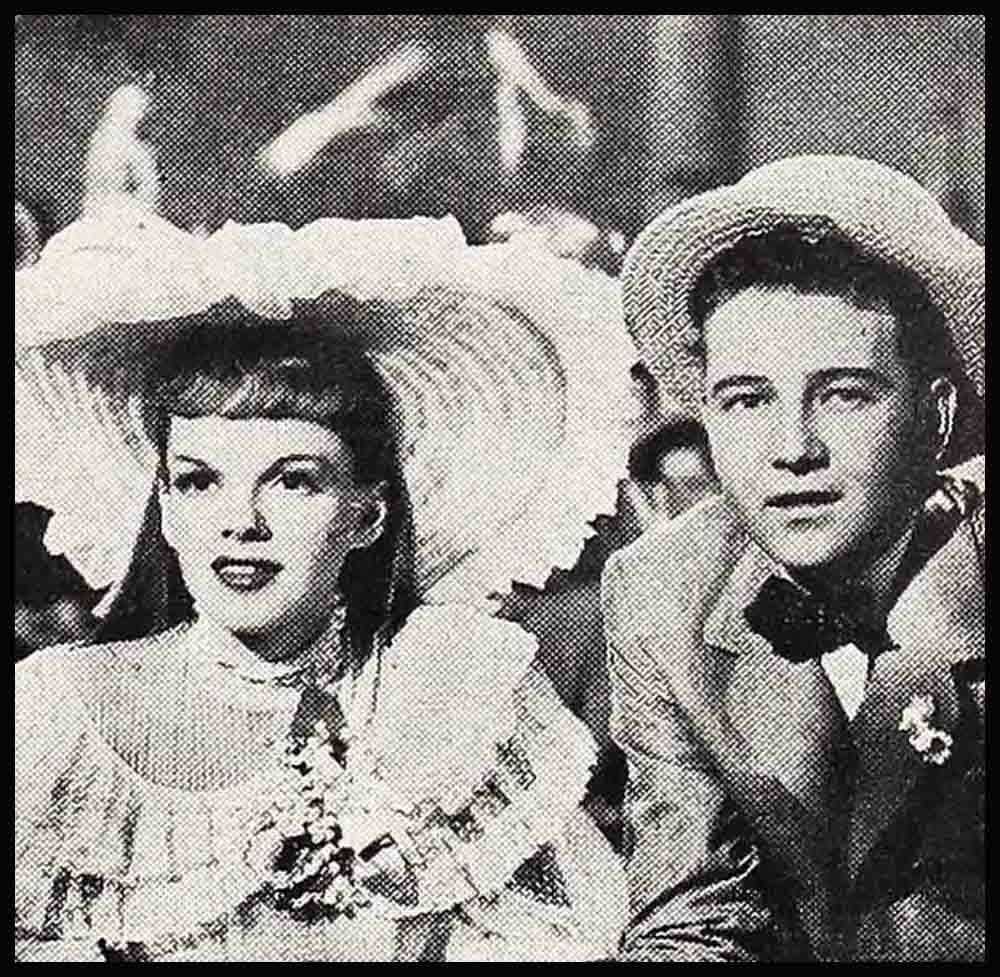
Go Out To A Movie
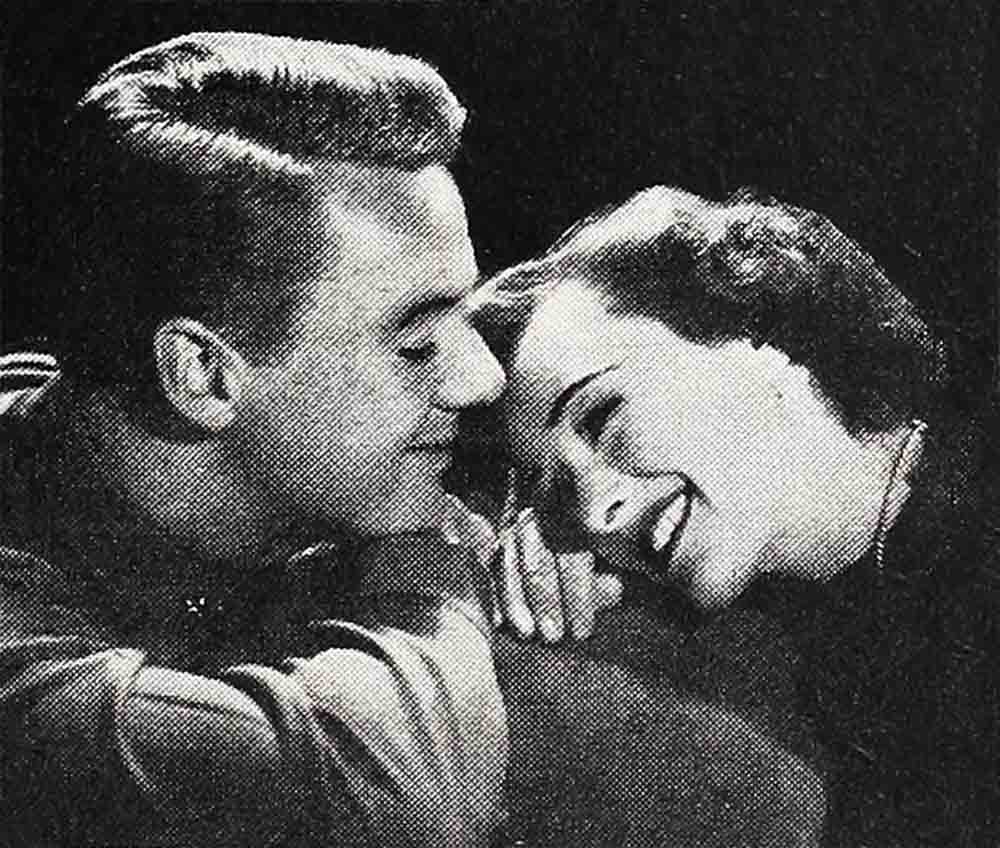
Thirty Seconds over Tokyo (M-G-M)
SINCERITY. It flows like a stream from the depth of this pictures heart. Integrity. It is mirrored in every detail. Simplicity. Hollywood forgets itself in the story of a man who has told his story so well that there is nothing to add or subtract. Life, at least this man’s life, that of Ted W. Lawson, then a lieutenant and now a major, is greater in appeal than anything cinema town could have dreamed up.
Everyone from General Doolittle down read the script and approved without one correction. Hence the authoritative reality of the story as told with Spencer Tracy in the role of Doolittle (then a lieutenant colonel) and his first bombing of Tokyo.
In the role of Lawson, Van Johnson deserves every rave heaped upon him. His eagerness, tinged with apprehension because of the wife he leaves behind, is expertly projected. And Phyllis Thaxter as his wife becomes an established factor in motion pictures, a charming, gracious actress.
The strength of Tracy, who requested this role subordinate to Johnson’s, is felt even when the actor is off the screen. For it was Doolittle’s mission to train these volunteer flyers secretly and mercilessly, and through Tracy we catch the strength and purpose of the man.
The self-effacing, never by a fraction overemphasized role of David Thatcher as played by Robert Walker is magnificent.
To the other lads, we pay tribute for performances that we will all long remember. The direction by Mervyn LeRoy is superb. The suspense created when Lawson’s bomber flies over Japanese territory makes the heart pound and the pulses throb.
Your Reviewer Says: Best of its kind.
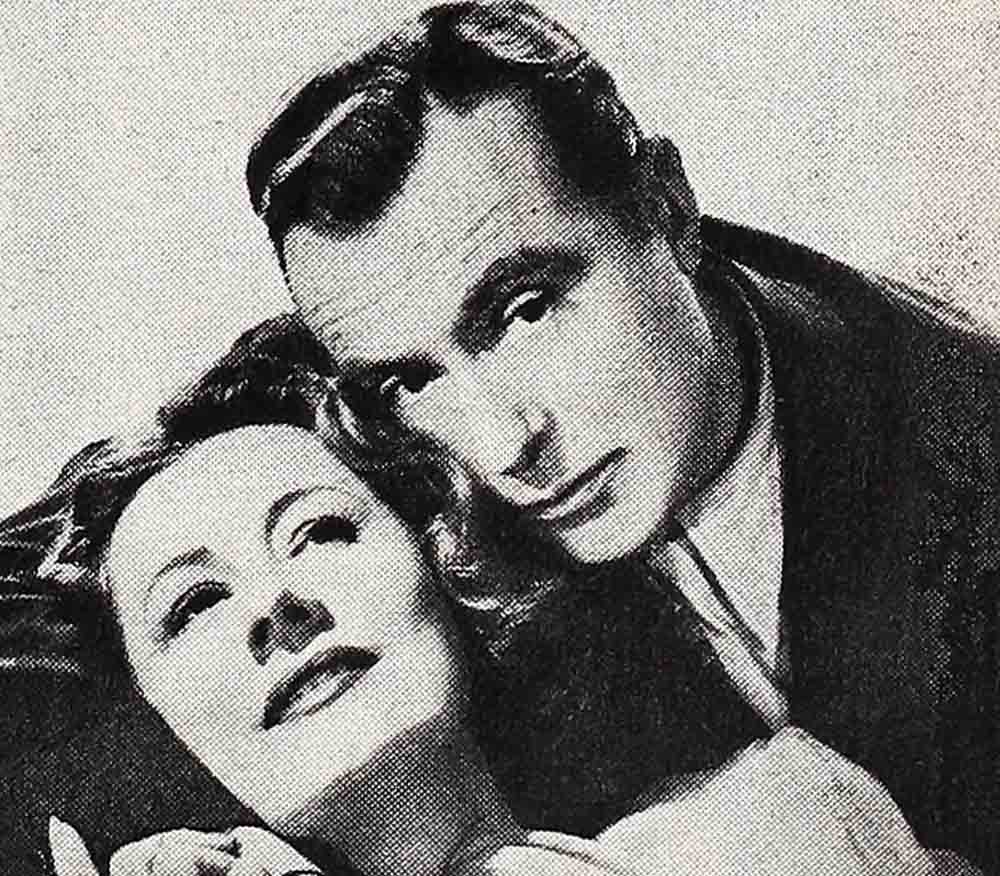
THE nice people all around us literally howled themselves blue in the face. So let us be the first to declare our need of a psychiatrist. A smile or two at what we considered a very feeble premise for laughter was about the best we could manage. But nevertheless and notwithstanding, it is bound to create hilarity all over the place, on that we can assure you.
Irene Dunne is beautiful as the mayor of a hidebound New England town who travels to New York in search of a sculptor to create a statue of her late husband. The old one (statue, not husband) got decapitated in a thunderstorm. So who is the sculptor? Monsieur Charles Boyer. And what does he do? He lands Miss Dunne in jail, follows her protesting footsteps home, captures the fancy of her young step-‘ daughter Mona Freeman and upsets Mayor Dunne in all directions at once.
Charles Coburn is her papa-in-law who wants love going on around him and gets it. He’s cute, too. But the lad that tickled us most (not literally, of course) is young Jerome Courtland, a tall gangling adolescent who can say, “Well, goodnight,” and make it not only good but a riotous evening.
Elizabeth Patterson is the housekeeper and poor Charles Dingle is still playing his “Little Foxes” role, and always will, it seems.
Your Reviewer Says: A spring cleaning of the heart.
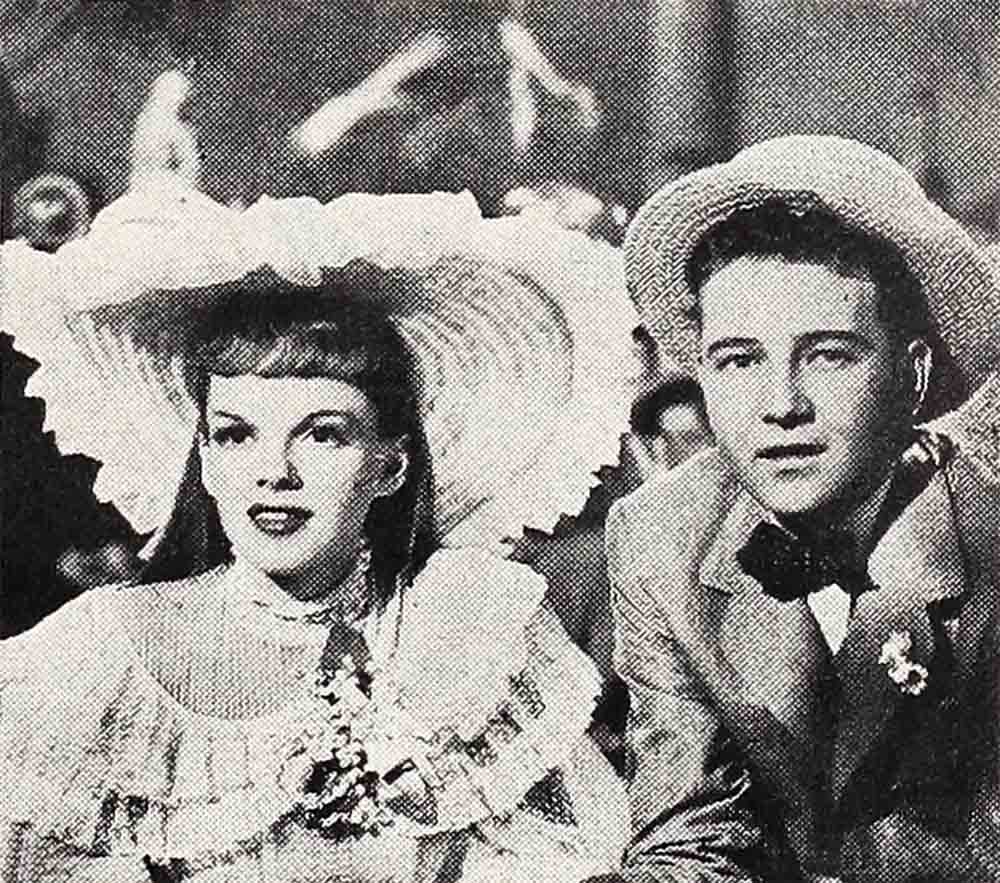
A STORY replete with charm, color, coziness of home and family, to say nothing of romance, is this so-different musical all wrapped up around a gay ninety tune hit “Meet Me In St. Louis.”
The Smiths of St. Louis are quite the nicest people you’ll meet anywhere, living back in the horse-and-buggy days in the Missouri city, and loving every stick and stone of it. There’s Judy Garland Smith, for instance, in love with Tom Drake, the boy next door. And there’s Mary Astor Smith, mother of the brood, and Leon Ames Smith, the father, who loves his family above business advantages. The other children, Margaret O’Brien as “Tootie” Smith, Lucille Bremer as Rose Smith, Henry Daniels Jr. as Lon Jr. and Joan Carroll as Agnes, fill the house and story to overflowing. In fact, there are moments, such as the Hallowe’en instance, when we feel the story tree more or less grows superfluous branches, but on the other hand, the plot is so very simple—that of a family who doesn’t want to move from St. Louis to New York—that it can afford a few detours.
The romance between Judy and Tom Drake is one of the most naturally developed ones ever to fancify a screen. Both are charming, and Judy’s singing of “The Trolley Song,” “The Boy Next Door,” and “Have Yourself A Merry Little Christmas,” is delightful.
Margaret O’Brien as the youngest of the family, is a “character,” no less. Shell either amuse or puzzle you, or perhaps she’ll do both.
Harry Davenport as Grandpa and Marjorie Main as the maid are simply necessary to the charm that dominates even the story itself.
Your Reviewer Says: A lovable, likable lulu.
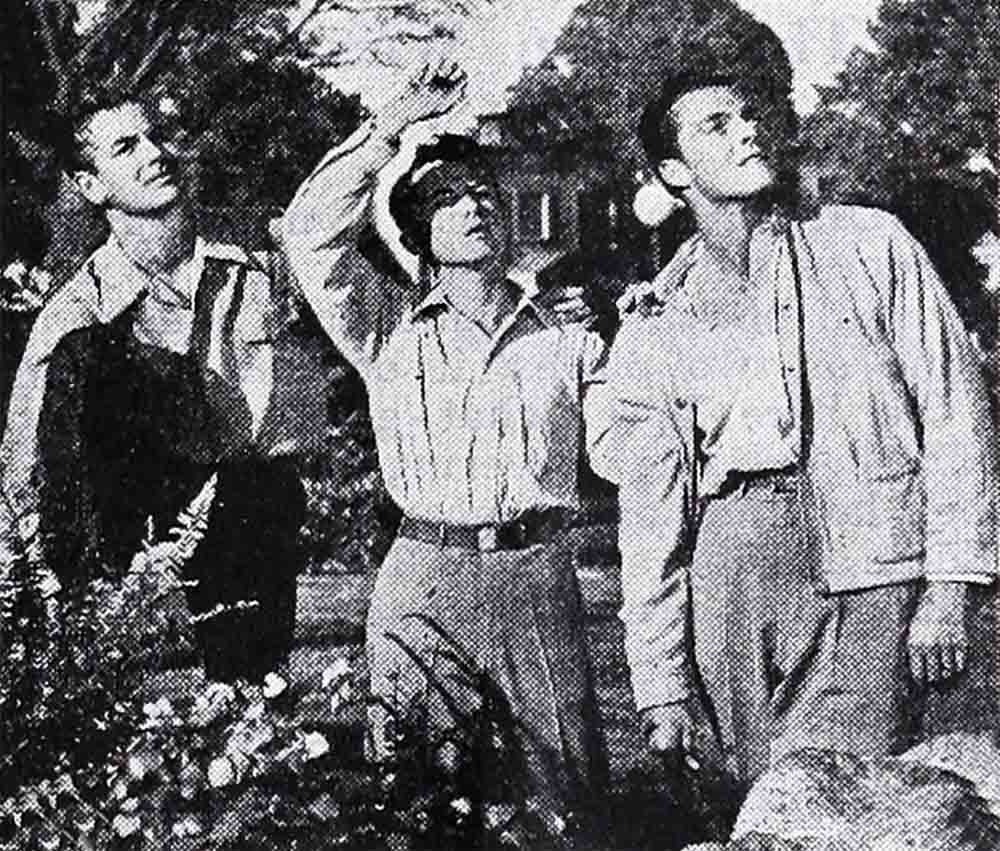
Winged Victory ( 20th Century-Fox )
ASTUPENDOUSLY detailed and almost documentary film stressing the personal angle of our own tremendous Air Force is this vitally important film, “Winged Victory.” But oddly enough its informative value surpasses its initial aim—that of entertainment—and yet it still remains a fascinating film, which is accomplishment for all concerned.
Its one drawback is its length—two hours and fifteen minutes of details that rise only occasionally to a crescendo of emotion—maintaining an even but never dull pace of events.
Every male member of the cast is a member of the Air Corps wearing the uniforms of Uncle Sam’s air men, all recruited from their various camps by Moss Hart for his “Winged Victory” stage show that now finds its realistic way to the screen.
The story begins with three boys, Lon McCallister, Don Taylor and Mark Daniels, from the same town receiving answers to their applications to the Air Corps. At camp they become buddies with Edmond O’Brien of Brooklyn and Barry Nelson, a farmer, and together they go through the gruelling tests and grinds that precede actual training. One of the lads is washed out and one killed in his first night solo flight—but the others carry on to combat duty in the South Pacific.
There are too many splendid performances to list—too many touching moments to recount, but it’s all here, epitomized in the indomitable spirit of our boys that are winging their share of the way to final Victory.
Perhaps the most outstanding or memorable performance is that delivered by Sgt. Edmond O’Brien with his inarticulate love of wife and kid and home and freedom. What a performance!
Wives of the boys are played by Jeanne Crain, Jane Ball, Jo-Carroll Dennison and Judy Holliday. And their part in the Great Campaign is not overlooked.
You shouldn’t miss this picture if for nothing else than the understanding, the oneness it gives, of and with our Air Corps boys, for long after the ordinary film of mystery, comedy or romance is forgotten, this one—the greatest romance story of them all—a man’s love for his country—will remain in your memory.
Your Reviewer Says: An American triumph.
Dark Waters (Bogeaus-United Artists)
WHOOO, are you going to be scared—unless, of course, you’ve read the story and had a bit of the edge taken from the suspense. But even so it’s a top-notch psychological mystery, peopled with interesting characters and alive with thrilling possibilities—some developed, some not. Then, too, there is a lack of polish in certain quarters, but those are minor faults and on the whole we pronounce it a thrilling and goose-pimply experience.
Merle Oberon is the girl whose parents were lost in a torpedoed ship at sea. Rescued, Merle is brought to New Orleans to recuperate in a hospital and in due time gets in touch with her uncle and aunt who live among the bayous of Louisiana. From there you’re on your own and don’t look to us for help.
Franchot Tone is the young doctor, Thomas Mitchell a visitor in the house of the aunt, Fay Bainter, and uncle, John Qualen. Elisha Cook Jr. is the overseer and Rex Ingram the handyman. All are good and so, by the way, is the direction of Andre De Toth.
Your Reviewer Says: Guess who and be scared to death at the same time.
COODIE, an independent company, PRC, comes through with a crackerjack story full of surprises and cozy laughter. In one or two places, it borders slightly on the here here what goes on school which keeps one wavering prudishly between laughter and concern.
Eddie Horton and Tom Tully as bickering neighbors are up to their jobs in every department with their respective wives, Ruth Lee and Minna Gombell, completely filling their assignments. They’re nice comfortable people in an average town who don’t get along too well, and they play it that way. But the story really gets going when it appears Horton’s son Freddie Bartholomew and Tully’s son James Lydon may have gotten switched at their births and each boy is living with the wrong parents. To complicate (which is a mild word for the situation) matters, Freddie has already taken out a marriage license to marry Tully’s daughter, who may now turn out to be his sister. So there you are in a mess up to your eyebrows and you’ll love it.
Jill Browning is cute as Freddie’s girl friend. Tres cute, indeed. Freddie and Jimmy are good too.
Your Reviewer Says: No wonder they went wild.
Enter Arsene Lupin (Universal)
GIRLS, quick—never mind the story but get a look at who’s here—Charles Korvin by name who is tres oo-la-la. What a lad! Where has Universal been keeping him, we wonder—before they unveiled him in this jewel-thief story of the crook who takes great pleasure in outcrooking other crooks (this is an awfully crooked story, isn’t it?) but is so darned charming about it all?
In the old Jack Barrymore role of Arsene Lupin, Charles—pardon—Mr. Korvin— finds himself all entangled with a precious gem, a beautiful girl, Ella Raines, and a comical French detective, J. Carrol Naish.
It’s more or less a mystery thing so we won’t spoil it by revealing the plot, but it’s a pretty good little show—at least a fair little handicap in which our hero wins, places and shows.
Miss Raines is an alluring sort of person and George Dolenz a light-fingered rascal if ever we saw one. Gale Sondergaard and Miles Mander are the rascals of the tale.
Your Reviewer Says: The check is for the players, not the story.
MARTHA TILTON, for so long heard on the radio, makes her debut as an actress-singer and proves the adage, seeing is believing, for we believe now Miss Tilton may win her way to a niche of her own in movies. She puts over her songs, especially “Let’s Capture This Moment” in fine style.
The story you can skip over lightly. It has to do with a juke-box operator whose voice leads to another girl getting a singing job through an error, and of course it takes at least forty minutes of everyone’s time to get it all straightened out.
Iris Adrian, Charles Collins, Cliff (double talk) Nazarro and Betty Brodel (mean? yeah man) seem happy to be in it.
Your Reviewer Says: We wouldn’t want to see it twice, you understand.
Lights Of Old Santa Fe (Republic)
DALE EVANS has a rodeo managed by Gabby Hayes. Roy Rogers and Richard Powers are two likely lads who are interested in both Dale and her rodeo, fast going on the rocks. So what happens? Singing, dancing, trick riding, fancy prancing by the fancy panty boys and everything but worry over the problem at hand.
Trigger is the prettiest one in it. Smartest, too.
Your Reviewer Says: Rootin’, shootin’, tunin’.
The Thin Man Goes Home (M-G-M)
NOW here’s a pity. We had ourselves all set up pretty to enjoy the return of Myrna Loy to the Thin Man pictures with all that gay old camaraderie and banter between Miss Loy and William Powell, and what happens? The story is third rate, the direction second and the performances of the cast disappointing—and that includes Miss Loy’s.
Mr. Powell, who has grown into a big bouncing boy, had nothing to work with. In fact, there were times when darned if we didn’t think Asta the dog was a bit on the ham side, so it must have been the direction or story or the wrong fire hydrants or something.
The cast boasted, besides the three above-named principals, Lucille Watson and Harry Davenport as Powell’s parents, Gloria De Haven, Helen Vinson, Leon Ames and Donald Meek as suspects, and Anne Revere as Crazy Mary. At least she admitted her condition right out in print. Edward Brophy was the man in the bushes and why did he bother to come out?
Your Reviewer Says: The mystery is—what happened to this picture?
Three Is A Family (Lesser-United Artists)
BABIES, babies, babies, everybody has babies and what’s more they have them right in the apartment of Charles Ruggles and Fay Bainter, with boys and diapers and formulas and labor pains all mixed up in a melee of fun and nonsense that everyone will enjoy.
It’s one of those wartime problem jobs that, thank heavens, we can all laugh at and do, especially when John Philliber as the decrepit old doctor who doesn’t like any part of this maternity business, comes trotting (well, no, not trotting exactly) into the picture. He well nigh killed us.
Helen Broderick, as the maiden aunt, is a poker-faced panic, and Hattie McDaniel the Scotch-happy maid (wonder where she got it), a joy. Marjorie Reynolds is the mother of twins and all three, Marjie and the babies, cute as pie. Arthur Lake, Clarence Kolb, Jeff Donnell, Walter Catlett, William Terry and Cheryl Walker keep the plot whizzing.
Your Reviewer Says: Fun in the nursery.
Murder In The Blue Room (Universal)
PEOPLE disappear right before our eyes, pianos play with no one at the keyboard (no, smartie, it isn’t an electric player piano either), while three hoofers, Grace McDonald, Betty Kean and June Preisser, sing and dance right through the midst of it (to us this is the greatest mystery of all) and finally, we discover who did it all but we never could figure out why—or are we stupider than most?
Anyway, it all happens when Anne Gwynne, her mother Nella Walker and stepfather John Litel reopen a haunted mansion with a party at which Bill Williams, a guest, disappears for good (he would sleep in that blue room!) followed by Donald Cook who finally manages to get into the picture several reels later with the mystery solved.
Present are Regis Toomey, Andrew Tombes and Ian Wolfe.
Your Reviewer Says: Keep out of blue rooms.
Belle Of The Yukon (International)
IF you love the chilly north, this may do something for you. But despite the cast—and you’ll admit Randy Scott, Gypsy Rose Lee, Dinah Shore, Bob Burns, William Marshall, Robert Armstrong and “Big Boy” Williams are some hunk of talent—it’s still a disappointing show and we only proffer our one-check approval because of these people who try so hard with the indifferent material provided.
Gypsy Rose Lee, who plays a dance hail gal in love with Scott, doesn’t have a chance to repeat the swell surprise she was in “Stage Door Canteen.”
Scott is one of those hero rascals that bore us stiff. Is you is or is you ain’t a villain is what we’d like to know, and none of this nonsense.
The plot, all about dance hail romances, stolen gold that isn’t stolen after all and such like, is too complicated for our time and dough.
Dinah Shore, however, sings several numbers with her usual appeal.
Your Reviewer Says: Could have been a bell-ringer.
Something For The Boys (20th Century-Fox)
TYPICAL Twentieth Century-Fox Tech nicolor musical, a little corny, a little vulgar, a little musical, a little funny and there you are—a little amused for a little money—we hope.
Instead of Grable and her legs we have Vivian Blaine and her prettiness, who also sings, smiles, dances and reads lines. We have Carmen Miranda too, and her indistinguishable lyrics sung to the same old South American tune (or so it seemed to us) and Phil Silvers and his glad-to-see-you brand of comedy.
The three, Phil, Vivian and Carmen, are relations who inherit a rundown Southern plantation which is taken over under direction of Sgt. Michael O’Shea, for army wives who cavort as no army wives we’ve ever seen.
Miranda garnishes a few laughs as a walking radio set (you heard me) and the tunes are purty. Silvers is funny in spots but on the whole it’s just an average fair-to-middling movie. Perry Como sings and Glenn Langan as an officer is tres good looking and they all dash merrily and nonsensically about.
Your Reviewer Says: We hope the boys appreciate this something.
My Gal Loves Music (Universal)
IT’S Bob Crosby, folks, in a little not-so hot number all about a crooner-band leader who sponsors the idea of putting on a local kid contest over the national hookup as sort of child prodigy selection. So who poses as a “toot wittle tid” but Gracie McDonald. What’s more she wins, and eventually falls in love with Crosby only to meet a block buster in Freddie Mercer, a real boy singer.
Walter Catlett and Alan Mowbray mug at each other, while Betty Kean warbles away for dear life. That Mercer boy has a voice not to be sneered at, either, as you’ll find out.
Your Reviewer Says: Oh well, the weather’s bad all over.
WE had more fun on the set of this picture, during its making, with its happy camaraderie among Richard Whorf (actor turned director for this one), the cast and visitors, than we did in its final form which, we fear, is more swayback than curvaceous.
The fault is the story, light as Aunt Em’s popovers, all about Philip Dorn, proprietor of a swanky cafe outside Reno, who flirts outrageously with a young blonde employee, all of which is taken with the proverbial grain of salt by Dorn’s wife, Mary Astor, until hubby wins a sweep-stake of $40,000 and the blonde moves in as Mary moves out, and hubby goes round and round the mulberry bush.
The blonde is the news of the picture. Her name is Gloria Grahame and she couldn’t be more promising—in fact, she promises nearly everybody but ends up with Marshall Thompson, the local yokel who has always loved her.
Felix Bressart, Curt Bois, Elisabeth Risdon and Arthur Walsh complete the cast.
Your Reviewer Says: This fever is subnormal.
GUESS where the Falcon (Tom Conway as usual) finds his murder mystery this time? In Hollywood of all places. It seems a leading man turns into a corpse (we know a lot of dead ones) and the Falcon, on a vacation in movietown, is edged into the case by Veda Ann Borg, a woman taxi driver. Well, you know how it is, one corpse leads to another and one mystery to another until the case is finally solved.
Barbara Hale, who wants to be in movies, Frank Jenks as a copper, John Abbott as a producer, all sock over their roles.
Your Reviewer Says: Any similarity between these characters and real ones is purely coincidental.
Main Street After Dark (M-G-M)
A SHORT punchy film that serves as a warning to service men against women and men crooks who haunt cheap beer and dance halls A family of such criminals, headed by Selena Royle, finally brings police lieutenant Edward Arnold cracking down on the gang and issuing a final warning to all men in uniform against this type.
Tom Trout and Audrey Trotter, newcomers to films, are members of this Faginish group of crooks. Dan Duryea, Hume Cronyn and Dorothy Ruth Morris complete the cast.
Your Reviewer Says: Pay attention, lads.
SO they got into political intrigue, attempted assassinations, kidnapping charges and Mary Boland’s kitchen. Who? None but Laurel and Hardy, still going strong after een-steenth years. What’s more, they have very good company in their boy-monarch foolery in the persons of Henry O’Neill, Philip Merivale and John Warburton. David Leland is the royal kid and personally we’d like to crown him.
Your Reviewer Says: How much longer is this going on?
It is a quote. PHOTOPLAY MAGAZINE FEBRUARY 1945





No Comments